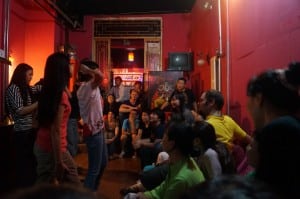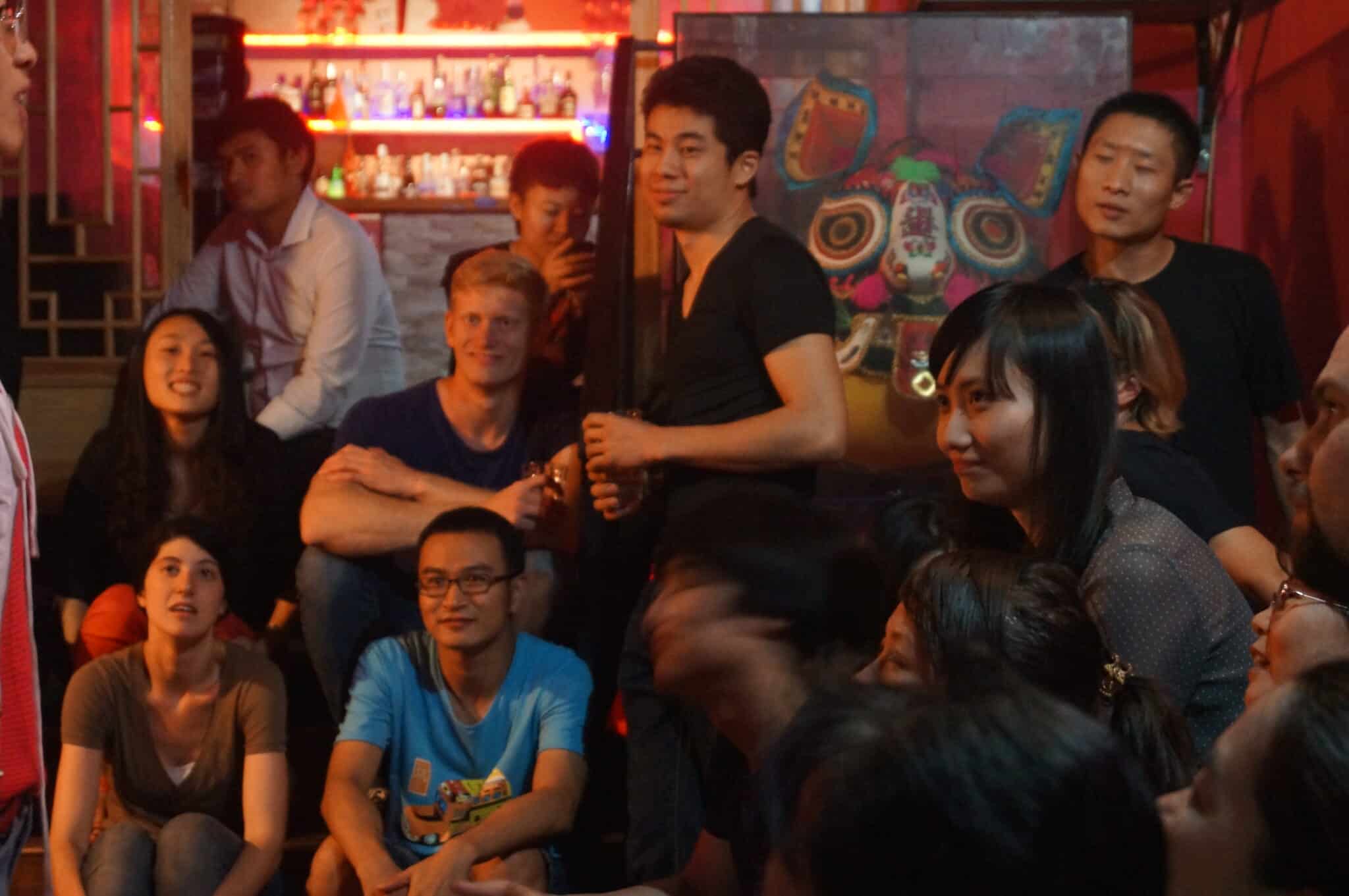The Hot Cat Club is a small bar/club hidden deep within a series of old “hutong(胡同)” alleyways not far from the Buddhist Lama Temple in Beijing. I went there to spend an hour or two at an improv workshop being held by Improv Beijing, and arrived 10 minutes before the start time to find the place deserted. I asked a tired-looking man nearby if there was a workshop tonight. “I don’t know, man,” he said. “I just came here to drink.”
This inauspicious beginning to the evening proved to be a false indicator of the night to come, as Beijing time dictates that people come whenever they want to and never early. By the time eight o’clock rolled around, the tiny club was packed to the gills with improvers, mostly Chinese, and comedians of all sorts. Forty people packed into a tight circle for warmups and soon sounds were flying and bodies moving.
The energy of the improv scene in Beijing seems to me like a tsunami wave, growing stronger and broader, largely unseen, beneath seemingly still waters. When I left China last year, I knew of two troupes, an English language troupe and a bilingual one. Now, at one night’s meeting, I counted representatives from seven groups, which included all-Chinese language performance troupes, and an all female troupe.
To me, the fact that new troupes are emerging, each exploring its own style of comedy, shows a real maturing of the comedy scene here. People are doing the type of improv they want to do, no longer bottlenecked by inability to access new styles or forms. The increasing diversity of the scene was summed up by a new friend I met named Zeng Cheng, who goes by the English name Caesar. “There are so many people here who want to do improv,” he said. “So there are new troupes being created all the time. We’re not all good, but we want to perform, and starting a troupe is free. This way, we all get to practice more, and we slowly get better.”
The workshop branched into advanced and beginner sections, with roughly half of the attendants going to each. New exercises were introduced bilingually and scenes alternated between English and Chinese in order to allow everyone to perform in the language they wished.
It was interesting to see how things could be different but still the same: At one point, there was a scene with a funeral, and I made to jump on a cabinet and play a statue of Jesus overlooking the scene. But just as I did so, a Chinese woman from the other side of the room stood on a chair and held her arms over her head, proclaiming she was the Goddess, and would look over the soul of the dead man. Her hands pinched imaginary incense sticks as she spoke. As improvisers, we both had the exact same thought for how to add to the scene — but the cultural trappings needed to evoke that addition were different.
The difference between Chinese performers and their Western improv counterparts is one of the things that interest me most of all. I mentioned to a Chinese woman about my interest in the cultural aspects of comedy, and she reminded me that Improv is a western art. “It’s not a Chinese thing,” she said. “If you want to get Chinese peoples’ sense of humor, you should stick to things like Xiangsheng.”
But when I told her that even if the form is western, if Chinese people who grew up in the tradition of Xiangsheng were the ones performing, the result was sure to be an interesting mix. Not western, not eastern… something else, somewhere in the middle, something new. And, I would attest, something Chinese.
Her eyebrows furrowed as she considered it deeply. I could see her mental gears working, considering a question that many Chinese now are considering in all walks of life: Can something still be Chinese if one of its defining characteristics came initially from outside of China?
History tells us that in the long run, the answer can be yes — consider the traditional Chinese instrument the Erhu, which initially came from the southern kingdoms outside of China, and the chili pepper, which pervades Chinese cuisine but came from the New World. But these changes happened slowly, perhaps over the course of several lifetimes. Will improv ever truly be a Chinese thing? Probably not. But when Chinese people are onstage speaking Chinese to Chinese audiences, I expect that in moments of laughter, the audience and performers both forget about distinctions such as nationality, and I think this is a clue to how comedy can tie us together.
热猫俱乐部是一个小酒吧兼俱乐部隐藏在一系列的老“胡同”里,就在离雍和宫不远的几条小巷里。我去那里要花一两个小时参加一个由即兴北京举办的即兴表演讨论班,我提前10分钟到达,找了个冷清的地方坐下。我问在我附近的一个看似很疲倦的男子,今晚是否有一个讨论班要在这里办。“我不知道,伙计,”他说。 “我只是来这里喝酒的。”
开头的不顺,到了晚上被证明是对即将到来的夜晚一个错误的预示,北京人的时间观念是这样的,他们想什么时候来,就什么时候来,从来没有早到过。到八点钟的时候,小俱乐部里挤满了即兴表演爱好者,他们大多数是中国人,还有各种喜剧演员。40个人排成一圈,很快音乐响起和大家都开始翩翩起舞。
在我看来,在北京做现场的即兴表演热情越来越高,甚至能和海啸波的能量相比,而且越来越强大并且更加广泛,看似静止的水域底下,暗藏着无穷的能量。当去年我离开中国的时候,我只知道两个团,一个英语剧团和一个双语剧团。但在今晚的聚会中,我数了数,有大概来自七组剧团的人,其中包括纯汉语表演团和所有的女性表演团。
我觉得专业剧团的出现意味着这种日趋成熟的艺术表演品味和风格将会有足够的曝光率。人们现在都愿意做他们想做的事情,不再像以前那么保守不愿意尝试不同风格或形式创新的即兴表演了。我近来结交一个新朋友,他的名字叫曾诚英文名是凯撒,他对日趋多样化的场景艺术进行了总结。 “有这么多的人在这里想做即兴表演”他说, “因此,会有越来越多的新剧团产生。并不是所有的剧团都很好,但是我们喜欢表演,想要表演,而且创办剧团又是免费的。这样一来,大家就有机会更多的练习,我们慢慢地就表演的越来越好了”
本次研讨会分为两个部分,一部分是高级班,一部分是初级班,两个班大约各有一半的人。新的练习引进了双语场景,为的是让每个人都能用自己喜欢用的语言来进行表演。
看看原本相同的事情用不同的语言表演会有什么不同,这是很有趣的一件事:一次,有一个葬礼的场景,我跳到一个柜子上扮演耶稣的雕像俯瞰现场。但正如我一样,隔壁的房间的一个中国女子也站在椅子上,将她的手臂举过她的头顶,宣称她是女神,并查看死去的人的灵魂。她手捏虚香,好似她在说话。作为即兴表演者,我们有相同的想法该如何融入场景 – 但所需的文化服饰使得我们的这种加入是不同的。
中国的即兴表演者和西方的即兴者之间的差异是我最感兴趣的事情之一。我对一个中国女人提到过我的兴趣在于喜剧的文化方面,她提醒我即兴是一种西方的艺术。“这不是中国人的风格”她说“如果你想了解中国人民的幽默感,你应该坚持欣赏相声一类的东西。”
但是,当我告诉她,即使形式是西方的,但如果一个中国人在传统相声的环境下成长起来的话,让这样的人来进行即兴表演,结果肯定会是一个有趣的组合。既不是西方的问题,也不是东方的问题,而是别的,在中间的某个地方,一些新的元素,而且我会证明这是一些中国的元素。
她皱起了眉毛,因为她在很认真地思考。我可以看到她的大脑在不停的旋转,动着脑筋,考虑着一个社会各界的中国人现在都在思考的问题:有些东西如果其定义的特征之一最初是源于中国之外的地方那还能算是中国的吗?
历史告诉我们,从长远来看,答案是肯定的。想一下中国的传统乐器二胡,最初来自中国以外的南方王国,还有红辣椒,在中国的各种美味佳肴中都有它的身影,但它也来自新的世界。但是这些改变都是慢慢地发生的,也许是几辈子的过程。我对一个问题一直很感兴趣,如果中国见证了数百年的工业革命的过程,在过去的一个世纪里只凝结成了一个辉煌的时代,那么中国人也会很快地接受这种我最喜爱的艺术形式,尽管存在着外来的想法。


